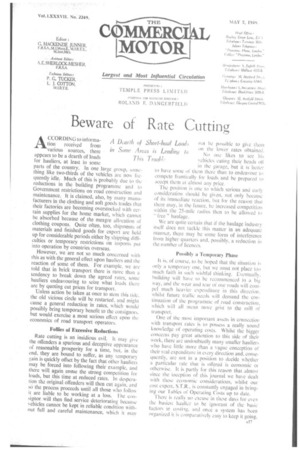Beware of Rate Cutting
Page 19

If you've noticed an error in this article please click here to report it so we can fix it.
ACCOR DING to information received from various sources, there appears to be a dearth of loads for hauliers, at least in some parts of the country. In one large group, something like two-thirds of the vehicles are now frequently idle. Much of this is probably due to the reductions in the building programme and to Government restrictions on road construction and maintenance. It is claimed, also, by many manufacturers in the clothing and soft goods trades that their factories-are becoming overstocked with certain supplies for the home market, which cannot be absorbed because of the meagre allocation of clothing coupons. Quite often, too, shipments of materials and finished goods for export are held up for considerable periods either by shipping difficulties or temporary restrictions on imports put into operation by countries overseas.
However, we are not so much concerned with this as with the general effect upon hauliers and the reaction of some of them. For example, we are told that in brick transport there is more than a tendency to break down the agreed rates, some hauliers endeavouring to seize what loads there are by quoting cut prices for transport.
Unless action be taken at once to stem this tide. the old vicious circle will be restarted. and might cause a general reduction -in rates, which would possibly bring temporary benefit to the consignors. but would exercise a most serious effect upon the economics of road transport operators.
Follies of Excessive Reductions Rate cutting is an insidious evil. It may give the offenders a spurious and deceptive appearance of reasonable prosperity for a time, but, in the end, they are bound to suffer, as any temporary gain is quickly offset by the fact that other hauliers may be forced into following their example, and there will again ensue the strong competition for loads, but this time at reduced rates. In desperation the original offenders will then cut again, and so the process proceeds until all those who follow it are liable to be working at a loss. The consignor, will then find service deteriorating because vehicles cannot be kept in reliable condition without full and careful maintenance, which it may not be possible to give them on the lower rates obtained. No one likes to see his vehicles eating their heads Odin the garage, but it is better to have some of them there than to endeavour to compete frantically for loads and be prepared to accept them at almost any price. • The position is one to which serious and early consideration should be given, not only because of its hmtediate reaction, but for the reason that there may, in the future, be increased competition within the 25-mile radius then to be allowed to free" haulage.
We are quite certain that if the haulage industry itself does not tackle this matter in an adequate manner, there may be some form of interference from higher quarters and. possibly, a reduction in the number of licences.
Possibly a Temporary Phase t is, of course, to be hoped that the situation is only a temporary one, but we must not place too much faith in such wishful thinking. Eventually, building will have to be recommenced in a big way, and the wear and tear of our roads will compel much heavier expenditure in this direction. whilst future traffic needs will demand the continuation of the programme of road construction. which will all mean more grist to the mill of is One of the most important assets in connection with transport rates is to possess a really sound knowledge of operating costs. Whilst the bigger concerns pay great attention to this side of their work, there are undoubtedly many smaller hauliers who have little more than a vague conception of their real expenditure in every direction and, consequently, are not in a position to decide whether a particular rate that is offered is economic or otherwise. It is partly for this reason that almost since the inception of this journal we have dealt with these economic considerations, whilst our cost expert. is constantly engaged in bringing our 'Fables of Operating Costs up to date.
There is really no excuse in these days for even the busiest haulier to be ignorant of the basic factors in costing, and once a system has been organized it is comparatively easy to keep it going.












































































